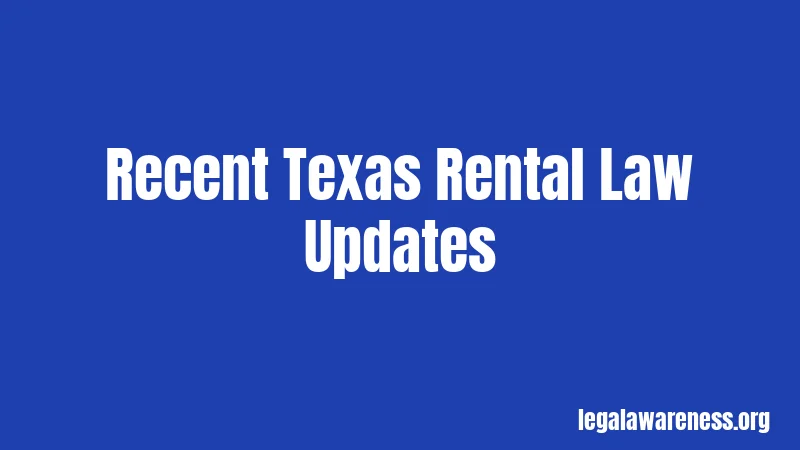Texas Security Deposit Laws (2026): Your Complete Guide to Rights and Protections
Most people don’t realize how specific Texas security deposit laws are. Seriously. Whether you’re renting for the first time or have been through it a dozen times, these rules can surprise you. The good news? Texas actually has pretty strong tenant protections when it comes to security deposits.
Here’s what you need to know: landlords in Texas must follow strict rules about how they handle your money. Get it right, and you’ll avoid legal trouble. Your landlord messes up? You could get your deposit back plus damages and attorney fees.
What Is a Security Deposit?

A security deposit is money you pay upfront to a landlord before moving in. It’s basically a financial cushion. Think of it like insurance. If you damage the apartment or skip out on rent, the landlord has that money to cover costs.
Here’s the key thing to understand: your security deposit is YOUR money. The landlord holds it temporarily. They can’t spend it on renovations or use it as an extra fee. It’s specifically for covering legitimate damage or unpaid rent. Pretty straightforward, right?
Basic Texas Security Deposit Rules
What Landlords Can Use Your Deposit For
Okay, pause. This part is really important. Landlords can only use your deposit for specific things. They cannot use it for normal wear and tear.
Your landlord CAN use your deposit to cover actual damages beyond normal use. This includes broken windows, huge stains, holes in walls, or damaged fixtures you caused. They can also cover unpaid rent or lease violations you caused. They can even deduct for cleaning if you leave the place filthy, but only if the lease specifically allows it.
Your landlord CANNOT use your deposit for maintenance that should happen anyway. Worn carpet? Normal wear and tear. Faded paint? Still normal wear and tear. A water stain from a leak they caused? Absolutely not deductible.
Not sure what counts as damage? Think of it this way: if a brand new tenant would see it immediately when walking in, it’s probably normal wear and tear.
Timeline for Returning Your Deposit
Texas law is crystal clear about timing. After you move out, your landlord has 30 days to return your deposit. That’s it. Thirty days.
During those 30 days, the landlord needs to either return your full deposit or provide an itemized list of deductions. The list must include specific amounts for each deduction. Vague descriptions don’t cut it.
Let me give you an example. Say you left a 2-foot hole in the wall. The landlord can’t just write “wall damage: $200.” They need to write something like “wall repair for 2-foot hole: $150 (materials and labor).” The more specific, the better.
If your landlord keeps your deposit longer than 30 days without explanation? That’s a violation. You might be able to sue.
Key Texas Security Deposit Protections

Itemized Deductions Required
This is honestly one of the strongest parts of Texas tenant law. When landlords deduct from your deposit, they MUST give you a detailed breakdown. No exceptions.
The landlord needs to send you this itemized statement by mail, email, or hand-delivery. They can’t just keep the money and hope you don’t notice. They have to show their work.
Each deduction needs a dollar amount and a description of what it covers. If repairs are needed, they should explain what was damaged and how much it costs to fix. You’re not alone—this confuses a lot of people about their rights. Many tenants don’t know they can challenge vague deductions.
Interest and Deposit Caps
Here’s where Texas is a bit different from some states. Texas does NOT require landlords to pay interest on security deposits. That’s pretty important to know.
However, Texas DOES allow security deposits to be placed in interest-bearing accounts. If yours is, you’re entitled to that interest. Your lease should specify whether your deposit goes into an interest-bearing account.
As for caps? Texas has NO legal limit on how much a landlord can charge for a security deposit. That means a landlord could theoretically charge multiple months’ rent as a deposit. Not great, but it’s legal. You have to negotiate that when you sign the lease.
What Happens With Unpaid Rent
If you leave with unpaid rent, yes, your landlord can deduct it from your security deposit. They can deduct all of it if that’s what you owe.
But here’s the catch: if the deduction is for rent, the landlord must provide written notice that they’re claiming against the deposit. They can’t just keep it quietly. You have the right to know why your money is being held.
If your landlord is unsure whether they’ll pursue you for unpaid rent later, they should probably wait. They can’t deduct for unpaid rent and then also sue you for the same rent. Double-dipping is not allowed.
What Landlords Cannot Do With Your Deposit
Cannot Use It as Rent Payment
This one trips people up. Your security deposit is NOT a prepaid last month’s rent. It’s separate. Completely separate.
A landlord cannot apply your deposit toward your final month’s rent without your written permission. If they try this, they’re violating Texas law. You can challenge it and potentially recover damages.
Sometimes landlords get creative and claim you agreed to this in the lease. Unless you specifically signed something saying your deposit goes toward the last month, don’t let them do it. Trust me, this happens more than it should.
Cannot Deduct for Normal Wear and Tear
Normal wear and tear is… well, normal. You live there. Things wear out. Carpets fade. Paint chips. Door handles get loose. These things happen.
The key question: would a reasonable person expect this damage from normal living? If yes, it’s normal wear and tear and the landlord can’t deduct for it.
Let’s say you’ve lived there for five years and the carpet is worn down to threads in heavy traffic areas. That’s normal wear and tear. The landlord can’t charge you to replace it. Now, if you spilled bleach on the carpet and created a large discolored patch? That’s damage beyond normal use and they can deduct for it.
Cannot Charge Vague Fees
Your landlord can’t charge your deposit for unclear reasons. They can’t write “miscellaneous damages: $500” and expect you to pay it. That’s too vague.
Each deduction must be for a specific repair or issue. The tenant should understand exactly what they’re paying for. If the landlord can’t explain it clearly, it’s probably not a legitimate deduction.
Recent Texas Rental Law Updates

Changes in 2024-2025
Texas hasn’t made major changes to security deposit law recently, but enforcement has gotten stricter. More tenants are suing over improper deductions, and courts are taking these cases seriously.
One thing worth knowing: the Texas Property Code (Section 92.103) is very landlord-friendly on paper, but courts interpret it strictly when it comes to itemization and timelines. Judges don’t give landlords much flexibility here.
Some landlords are now using more professional property management because they’re worried about lawsuits. This generally benefits tenants because professional managers know the rules better.
How to Protect Your Deposit
Document Everything When Moving In
Here’s my best advice: take photos and videos when you move in. And I mean thorough photos. Get close-ups of any damage, stains, or wear. Timestamp them if you can.
Walk through with the landlord and make note of existing damage together. Ask them to sign off on this condition report. This is huge. If your landlord tries to blame you for something you found there, you have proof.
Keep these photos somewhere safe. Email them to yourself. Backup to the cloud. You’ll need them if there’s a dispute.
Create a Move-In Condition Report
Before you unpack a single box, write down everything you notice about the apartment’s condition. Be specific. Don’t write “living room okay.” Write “living room: carpet has worn area near couch (existing damage), paint is original, baseboard has small crack (existing).”
Ask your landlord to sign this report. If they won’t, date it and send them a copy anyway. This creates a record that you documented the condition before moving in.
This step prevents almost all deposit disputes. Seriously. When there’s documentation, landlords are way less likely to try unfair deductions.
Get Receipts for Repairs
If you make repairs to the apartment (and your landlord allowed you to), keep the receipts. Keep pictures of before and after.
Say you patched a small hole in the wall and painted over it. That’s normal maintenance. But if you damaged something and paid to fix it, keep proof. This shows you took responsibility and tried to make it right.
Request a Final Walkthrough
Before you move out, ask your landlord to do a final walkthrough with you. This is totally reasonable and many landlords will do it.
During this walkthrough, you can ask about potential deductions. You can also point out damage that was already there. This conversation prevents confusion later.
If the landlord says “this wall damage will cost $300 to fix,” you know what to expect on your itemized deduction. No surprises.
If Your Landlord Breaks the Rules
What Violations Look Like
Your landlord violates Texas security deposit law if they don’t return your deposit within 30 days without providing an itemized list. That’s the big one.
They also violate the law if deductions are vague or unclear. If they use your deposit as rent without permission. If they deduct for normal wear and tear. If they don’t provide written notice about deductions.
So if any of these happen, your landlord is breaking the rules.
How to Respond
First, send a formal written request for your deposit or an itemized list. Keep a copy. If possible, email it or send it certified mail so you have proof they received it.
Give them a reasonable deadline, like five business days. Be professional in your tone. You’re documenting the issue for potential legal action.
If they don’t respond or the response is unsatisfactory, you have options. Small claims court is one. Texas courts take these cases seriously.
Small Claims Court
Small claims court is designed for disputes like this. You don’t need a lawyer. You don’t need to spend thousands of dollars.
In Texas, small claims court handles cases up to $20,000. Security deposit disputes usually fall well under this. The filing fee is minimal (usually $50-150 depending on the amount).
You’ll present your evidence: photos from move-in, the lease, the condition report, the landlord’s itemized deduction (or lack thereof), your proof of payment. The judge will decide.
If you win, you get your deposit back. You might also get damages (up to treble damages, meaning three times the amount wrongfully withheld) and court costs. Some cases result in attorney fees too.
Small Claims vs. Regular Court
Small claims court is way easier than regular civil court. You don’t need fancy legal documents. You don’t file motions. You just show up, explain what happened, and present your evidence.
Regular court is overkill for security deposit issues unless you’re dealing with a really large amount or other violations. Most tenants win their cases in small claims.
The downside of small claims? The judgment amount caps at $20,000. Most security deposits are way smaller than that, so this isn’t usually an issue.
Special Situations
What If You Break the Lease Early?
If you break the lease and move out early, the landlord can still hold your deposit for damages. However, they still must follow all the rules about itemized deductions and the 30-day return period.
Some landlords try to keep deposits when leases end early, claiming “lease violation.” But unless there’s actual damage or unpaid rent, they can’t legally keep it.
Shared Housing and Deposits
If you’re renting a room in a shared house and paying a deposit, the same rules apply. Whoever collected your deposit (landlord or housemate) must follow Texas security deposit law.
This can get messy if a roommate collected your deposit. You might have a harder time enforcing your rights. Document everything even more carefully in these situations.
Deposits for Multiple Properties
Some people rent multiple properties in Texas (like a house and a garage space). Each property can have its own deposit. The rules apply equally to each one. Don’t assume different rules for different properties.
Frequently Asked Questions
What if my landlord says they lost the deposit?
They’re still responsible. Lost deposit, stolen deposit, whatever happened—the landlord is liable. You can sue for the deposit amount plus damages and court costs. They should have had insurance or proper procedures to prevent loss.
Can a landlord use my deposit to cover late fees?
Only if the lease specifically allows it and you actually owe late fees. The lease must clearly state this upfront. Even then, it must be itemized. A vague deduction for “late fees” isn’t acceptable without specifics.
How long can a landlord hold my deposit after I move out?
Thirty days maximum. If they claim they need longer to assess damage, too bad. That’s not allowed under Texas law. They have 30 days to itemize and return it or explain deductions.
What if my deposit wasn’t returned, period?
You have a clear violation. Send a formal demand letter. If they don’t respond within a reasonable time, file in small claims court. You’re owed the deposit plus potential damages.
Can a landlord charge for painting or carpet replacement?
Only if YOU damaged the paint or carpet beyond normal wear and tear. If the paint is just faded from five years of sunlight, that’s normal wear. If you put a fist through the wall, that’s damage. Normal carpet wear after five years? Not chargeable. Permanent stains you caused? Chargeable.
Is there a statute of limitations for deposit disputes?
Yes. You generally have two years from the lease end date to sue for improper deposit handling. Don’t wait forever, but you have time to gather documents and respond.
What if the landlord includes a “non-refundable fee” in the lease?
Interesting question. Texas classifies anything that looks like a security deposit as a security deposit, regardless of what you call it. If it’s money held to cover potential damage or violations, it must be treated as a security deposit and returned within 30 days.
Some landlords try to dodge this by calling things “non-refundable cleaning fees” or “non-refundable pet deposits.” Courts don’t always buy it. If it functions like a security deposit, it IS one.
Final Thoughts
Texas gives tenants pretty solid protections when it comes to security deposits. The rules are clear, and courts take violations seriously.
Here’s the reality: most landlords follow the rules. They return deposits on time with proper itemization. It’s the problem landlords who try to keep money unfairly.
Protect yourself. Document everything. Take photos. Keep records. If your landlord violates the rules, don’t let it slide. You have legal remedies available.
Stay informed, stay protected, and don’t hesitate to take action if you need to. Now you know the basics.
